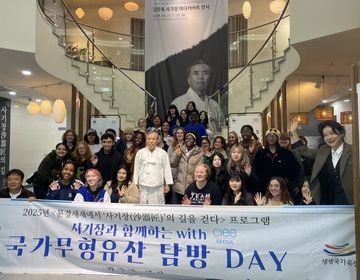Korean VS American Values Through My Personal Lens
Recently, I have been reflecting on the core values of my home country, the United States, and those of Korea. Recent experiences have caused me to reflect heavily on my own values as an individual, largely influenced and informed by my community and broader American culture. They are easy for me to remember and engage with as a student of the Korean language. ‘우리’ is quite literally “we,” implying collectivism, ‘눈치’ comprises of ‘eye’ and ‘measure’, and ‘서열’ (hierarchy) is often talked about these days. I wanted to take this opportunity to flesh out exactly my feelings towards these values, which have been informed by my day-to-day living, conversations with Koreans, but also my own biases. That being said, there is no doubt my interpretation and understanding is flawed and incomplete, but does provide me with a clearer lens with which to view the world.
‘눈치’ (Nunchi: The ability to size up a situation) was the only value I had known the Korean for before learning about it in class. While I was out eating 육회 (raw meat) one night with a friend, my slightly drunk self knocked over chopsticks onto the floor, and the server (quite literally) teleported behind me with a new pair. She had seen me looking down at the floor from across the restaurant, after hearing the high pitch of metal striking the ground. Although not exactly 눈치 in its most recognizable sense, she surely possessed the ability to quickly and accurately assess the situation, as is the meaning of the word. She did not say a word throughout the whole interaction, but I was so thankful. I aim to have this same kind of superpower that my server seemed to possess.
‘인간족’ (Eenganjok: Human relations) has shown itself to be integral to Korean culture whenever I manage to get myself lost. I feel I am helped much more if I’m lost at a train station by some 할머니 (older woman) than when I had been in similar situations in New York City. Sometimes I feel so much compassion that I cannot express enough thankfulness through the difficult language barrier.
From what I could derive from conversations with my Seoul Mate, ‘큰면’ (Keunmyun: Hard work) and ‘서열’ (Seoyeol: Hierarchy) are the most controversial values, and at least for me the most difficult to understand as well. I understand the importance of working hard, and I also understand the need to respect those who are older or have higher positions than you. But I certainly held (and still hold) the misperception of South Korean society as being both overworked and authoritarian in some ways. This is most evident in school, where it is impossible to be semi-casual with your professors, and Koreans are much more hard working and devoted to their studies. Of course, others would not view Korean society the same way.
‘우리’ (Woori: We-ness) speaks for itself. Collectivism is certainly the most identifiable aspect of Korean society. I definitely feel that the difference between Korea’s collectivist society and America’s individualist society is not as strong as many would say it is. To have a more collectivist attitude, in my opinion, is important and ideal for a well-functioning society. Of all the values, this difference was the easiest to understand, as I have heard about this difference for so long now.
Finally, ‘체면’ (Chaemyon: Social Face) is the one I feel I see the least while here in Korea. I would still agree that the need to protect one’s dignity and appearance are more important here, but Americans also care a lot about this (depending on where you go). These are the values I need to look out for as the end of the semester quickly approaches. Maybe this value will make itself more evident to me once I arrive back home and can compare the 채면 between both countries.
Having identified the above Korean values and applied them to my own life and experiences, I feel I have become more understanding and aware of cultural differences and my own values. I have definitely experienced these during study abroad, whether I be in some particular situation or peering from the outside in. I feel much closer to South Korea as a whole after having understood these. Values of any culture comprise its core, distinctive character.
Related Posts

Soul Searching in Seoul: Everything I Learned and What I Wish I Knew
Before I start crafting my “study abroad changed me” answers for friends and family, here are the practical things I wish I’d known. The things that would’ve saved me time... keep reading

A Seoul Escape to Bukhansan
Get out of the hustle and bustle of Seoul and head to the peak of Bukhansan!

My Time in South Korea Attending Yonsei University: A Life-Changing Chapter
By: Zahrraa Al-Salman Studying abroad had always been a dream of mine—an opportunity to step outside of my comfort zone, immerse myself in a new culture, and deepen my understanding... keep reading
